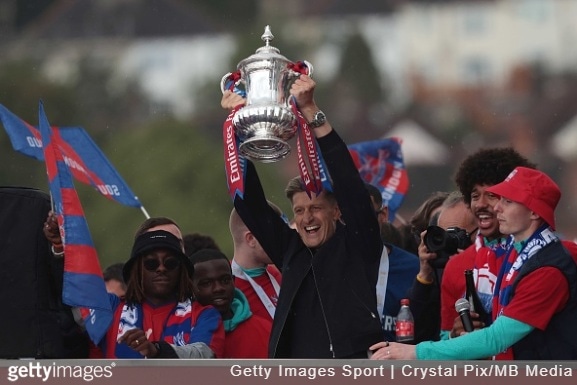Crystal Palace’s unexpected qualification for the Europa League has hit a major obstacle due to UEFA’s rules on multi-club ownership, putting their European dream at risk. At the heart of the issue is American businessman John Textor, who owns a 43% stake in Crystal Palace and a controlling 88% in Olympique Lyon – another club that has qualified for the Europa League. UEFA’s rules prohibit individuals or entities from having “decisive influence” over two clubs participating in the same competition, aiming to prevent conflicts of interest in the integrity of the tournament.
Steve Parish, Crystal Palace’s chairman and public face of the club, has been lobbying UEFA to argue that Palace should not be considered part of a multi-club structure. Parish insists that Textor’s role at the club does not constitute decisive influence. Although Textor holds a significant equity stake, his voting power within the club is limited to 25%, with fellow stakeholders Josh Harris and David Blitzer generally aligning with Parish, who holds the casting vote.
Textor has even publicly expressed frustration at his lack of control. Despite these assurances, UEFA’s primary concern lies not in perception but in the formal legal documents that define ownership and control. That hard evidence may still count against Palace.
This case, complex and legalistic as it may be, is also a deeply symbolic moment in modern football. It exposes how romantic success stories, like Crystal Palace’s, are increasingly vulnerable to the sport’s transformation into a global business enterprise. The club’s remarkable season – outperforming expectations and earning a coveted European spot – now risks being soured not by poor performance or scandal, but by governance failures and legal technicalities. It’s a grim irony for a club that has long been associated with gritty resilience and authentic fan culture.
Fans had already sensed trouble ahead. Over a year ago, Palace supporters unfurled banners at Selhurst Park decrying multi-club ownership and directly criticizing Textor. These early warnings were largely ignored, with ownership focused instead on short-term gains rather than long-term compliance. Now, with UEFA’s scrutiny intensifying, the consequences of that neglect may be severe.
According to current reports, Palace missed a key March deadline to place the club in a blind trust – an administrative move that might have resolved this situation. Evangelos Marinakis used this method with Nottingham Forest to avoid a similar conflict between Forest and Olympiakos. Palace’s decision not to act in time, whether through oversight or reluctance to tempt fate before their Europa qualification was secure, has proven costly.
Underlying this drama is a broader crisis in football governance. The sport is rife with examples of fragmented regulation and reactive, rather than proactive, policymaking. Multi-club ownership now involves more than 400 clubs across nearly 150 ownership networks worldwide. Despite the scale of this development, FIFA has never clearly defined what constitutes a “club” in regulatory terms. Without a shared definition, enforcement becomes vague and inconsistent. Many within the industry criticize UEFA’s handling of these matters as lacking transparency and favouring wealthier, more influential clubs.
Indeed, some suggest that Palace is suffering because it is not among the European elite. There is a sentiment that big-name clubs are rarely affected by these kinds of issues. The European Club Association (ECA), chaired by PSG president Nasser Al-Khelaifi, is viewed as representing the continent’s largest clubs and their interests. In contrast, Parish has been involved with the Union of European Clubs (UEC), which seeks to represent smaller and mid-sized clubs who often feel excluded from elite decision-making circles. Some see this political dynamic as another layer in Palace’s unfolding troubles.
The implications of this case go beyond just one club. It is emblematic of football’s current contradictions: a global game built on local identity, now governed by transnational financial and legal frameworks that often clash with fan values and club traditions. Clubs like Strasbourg and Troyes, now parts of multi-club systems under larger entities like Chelsea or the City Football Group, have effectively lost their autonomy. They now serve the strategic goals of the parent club, usually the wealthiest and most prominent in the structure. The concern is that football’s original spirit—of competition, of community, of unpredictability—is being eroded in favour of streamlined, profit-oriented structures.
Crystal Palace’s Europa League qualification could have been one of the great modern football stories: a club defying the odds and breaking into continental competition. Instead, it has become a cautionary tale about the consequences of unregulated ownership models and UEFA’s lagging regulatory framework. There is still hope that UEFA will take a lenient view, perhaps recognising the unique circumstances or the minimal actual control Textor exercises at Palace. Yet even if Palace are allowed to compete, the cloud over their achievement remains a sobering reflection of how precarious success can be in the modern game.
This situation underscores the urgent need for reform. Football authorities must clarify ownership rules and enforce them fairly and consistently. Clubs need to take greater responsibility for ensuring compliance with governance standards. And fans—whose voices warned of this outcome long ago—must be more meaningfully included in the stewardship of the clubs they support. As Palace wait anxiously for UEFA’s decision, their case stands as both a warning and a rallying cry: football must decide what it wants to be—a community-driven sport or a business-first industry.
In conclusion, Crystal Palace’s Europa League hopes are endangered by an ownership model that has grown faster than the rules designed to contain it. Unless football’s governing bodies respond decisively and transparently, stories like Palace’s will become more common – and even more disheartening.












